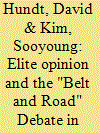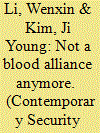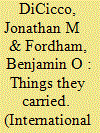|
|
|
Sort Order |
|
|
|
Items / Page
|
|
|
|
|
|
|
| Srl | Item |
| 1 |
ID:
109964


|
|
|
|
|
| Publication |
2012.
|
| Summary/Abstract |
This article1
investigates public opinion on New Zealand's foreign policy, drawing on the findings of a comprehensive poll of general public and elite opinion conducted in 2008. It analyses what New Zealanders think about a range of foreign policy issues and whether public opinion matches actual foreign policy. It argues that the majority of the public support the broad parameters of official policy, but that there are significant differences of opinion in some specific areas, particularly trade agreements and defence. These differences correspond in particular to political orientation and age, gender and income level. The article also outlines the key differences between public opinion and the opinion of the positional elite. Overall, it is argued that the New Zealand public does have clear opinions on foreign policy issues and that these are generally consistent. The article proposes more frequent polling and more public debate over foreign policy.
|
|
|
|
|
|
|
|
|
|
|
|
|
|
|
|
| 2 |
ID:
163466


|
|
|
|
|
| Summary/Abstract |
This article analyzes elite opinion in South Korea as it applies to China's One Belt, One Road initiative (OBOR), in order to better understand how a prominent Asia-Pacific middle power and US ally is approaching this development. Through a close analysis of the writing of foreign-policy elites in South Korea from 2013 to 2017, the study finds that OBOR was generally depicted as significant to China's re-emergence in regional and global affairs, but not as wholly detrimental to South Korean interests. Elites did not speak with one voice, but presented the government with a comparatively sanguine view of OBOR. The debate, we illustrate, created unlikely alliances between left- and right-leaning elites about some aspects of the initiative, but it also revealed tensions among conservative and centrist elites. In seeking to demonstrate their relevance to policy makers, however, elites inadvertently underlined their growing distance from the general public.
|
|
|
|
|
|
|
|
|
|
|
|
|
|
|
|
| 3 |
ID:
174731


|
|
|
|
|
| Summary/Abstract |
What has driven China’s policy toward United Nations (UN) sanctions on North Korea? While insisting on a peaceful settlement of North Korean nuclear issues via diplomatic dialogues, China has gradually loosened its protective stance regarding UN sanctions on North Korea. This article examines the factors that have pushed China to take a tougher position toward North Korea: North Korea’s increasingly aggressive nuclear policy, the influence of the United States on Chinese foreign policy, and the changing perception of North Korea in China. Through close examination of China’s domestic discussions on North Korea, this article concludes that, besides the external factors, a growing negative perception of North Korea has played an increasingly important role in changing China’s official stance. The findings suggest that closer attention should be paid to the changes in the domestic political environment of China to understand its current and future approach toward North Korea.
|
|
|
|
|
|
|
|
|
|
|
|
|
|
|
|
| 4 |
ID:
087980


|
|
|
| 5 |
ID:
158691


|
|
|
|
|
| Summary/Abstract |
Do foreign policy elites who shared formative political experiences also share similar views on subsequent policy issues? Proponents of a generation effect suggest that they do, but this argument overlooks two facts: (1) not everyone experiences major historical events in the same way and (2) different experiences might give rise to quite different policy views. Here we investigate the impact of the Vietnam War on elite opinion about foreign policy during the following two decades using elite surveys conducted by the Foreign Policy Leadership Project (FPLP) from 1976 through 1996, assessing their susceptibility to what has been called the Vietnam Syndrome. Not surprisingly, we find that age and military service influenced elite opinion about the Vietnam War. More importantly, we find that different trajectories of opinion about the Vietnam War influenced later views about a wide range of foreign policy issues during the Cold War, even after controlling for party identification and ideology. However, we see little evidence that these effects persisted after the end of the Cold War. This finding holds even on matters like civil war intervention, for which we might expect the experience of the Vietnam War to remain relevant. Our analysis suggests that the Vietnam Syndrome is restricted to matters involving Cold War rivalry.
|
|
|
|
|
|
|
|
|
|
|
|
|
|
|
|
|
|
|
|
|